Introduction
Are you looking to implement chatbot into your business and confused between Facebook and WhatsApp chatbot?
Then, welcome to the blog on a hot topic taking the customer service world by storm: Facebook Chatbot vs. WhatsApp Chatbot.
Did you know that Facebook Messenger boasts an impressive 1.3 billion active users monthly? That's right; it's a big deal. On the other hand, WhatsApp has a staggering 2 billion users worldwide. Talk about widespread adoption!
This comprehensive blog will explore the features, user reach, ease of development, and more for both platforms.
We'll weigh the pros and cons of Facebook Chatbots and WhatsApp Chatbots and provide you with valuable insights and real-world examples to guide your decision-making process. Let's go!
What is Facebook Chatbot?
If you're a regular Facebook user, you might have encountered chatbots without realizing it.
Facebook chatbots are AI-powered virtual assistants that can interact with users through the Facebook Messenger platform. These nifty bots are designed to mimic human conversation, providing quick and helpful responses to user queries.
Facebook chatbot platforms offer many features that make them a game-changer in customer service.
They can handle various tasks, such as answering frequently asked questions, providing product recommendations, and processing payments. These bots can also be integrated with other platforms and tools, enhancing their functionality and reach.
What is WhatsApp Chatbot?
WhatsApp chatbot platforms are virtual assistants designed to interact with users through the popular messaging app WhatsApp.
These chatbots are designed to comprehend natural language and respond to users' questions properly.
WhatsApp chatbots are becoming increasingly popular due to the widespread adoption of the messaging app worldwide.
However, unlike Facebook Messenger, WhatsApp chatbots are limited by the platform's API. This means that WhatsApp chatbots' functionality and capabilities are more restricted than Facebook chatbots.
Facebook Chatbot vs WhatsApp Chatbot: Features and Functionality
In this section, you’ll find the comparison on features and functionality between Facebook chatbot vs WhatsApp chatbot.
Features of Facebook Chatbots
The features of Facebook chatbots are the following:
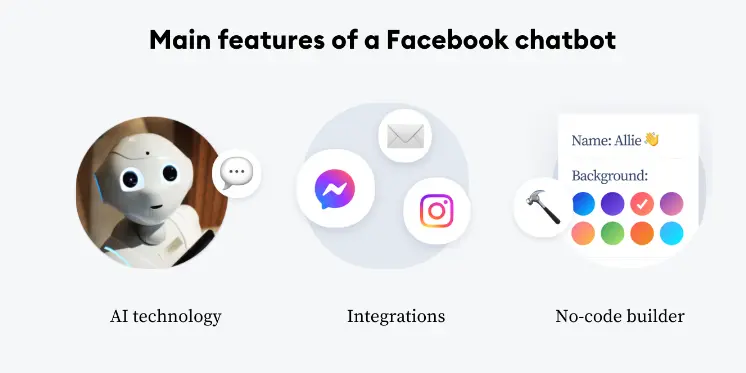
NLP capabilities of Facebook chatbots
Say goodbye to robotic interactions! Facebook chatbots have natural language processing (NLP) capabilities, which means they can understand and interpret human language.
Engaging in conversations with these chatbots feels like chatting with a friend - but with speedy responses.
Integration with the Messenger platform
Facebook chatbots seamlessly integrate with the Messenger platform, making it oh-so-easy for businesses to connect with their customers.
From answering queries and providing recommendations to automating tasks, these chatbots are here to save the day. Your customers will love the personalized experience and the convenience of having all interactions in one place.
Suggested Reading:
Are Facebook Chatbots Worth the Hype? An Analysis
Sentiment analysis and personalized responses
Facebook chatbots are more than just good listeners. They quickly analyze the sentiment behind a user's message and respond accordingly.
So if a user is feeling down or frustrated, the chatbot platforms can offer empathetic and personalized responses. It's like having a virtual friend who truly understands!
Features of WhatsApp Chatbots
WhatsApp may be known for its casual conversations with friends and family, but did you know it can also be a powerful tool for businesses?
Yes, and here are the features showcasing that:
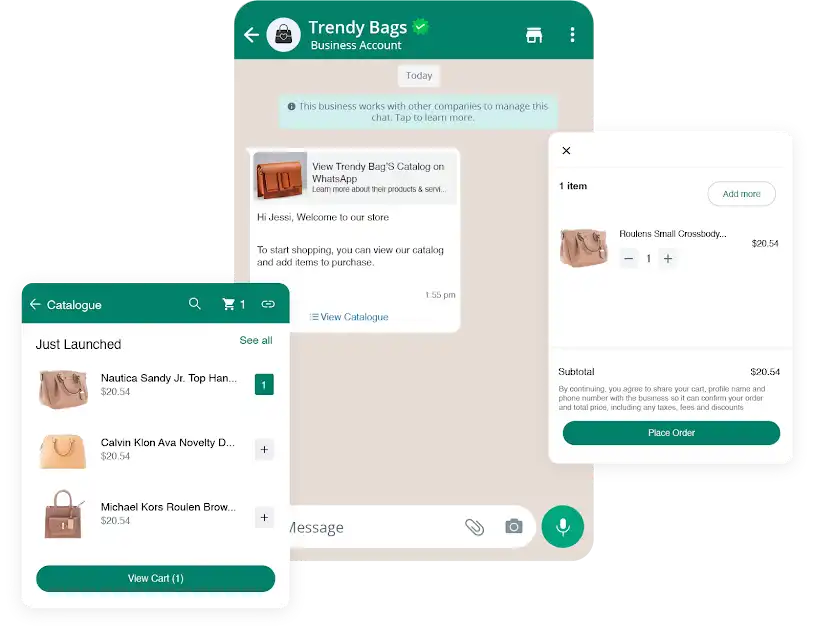
Limitations and Functionality of WhatsApp Chatbots
While WhatsApp chatbot platforms have some limitations, they still offer valuable functionality for businesses.
One limitation is the restricted use of promotional messages. However, companies can get creative with engagement strategies and find ways to provide value without being overly promotional.
Importance of WhatsApp Business API
To harness the full potential of WhatsApp chatbots, businesses can utilize the WhatsApp Business API.
This API allows companies to create chatbots that handle customer inquiries, automate processes, and provide support. With the right setup, businesses can offer a seamless experience for their customers and build stronger relationships.
Suggested Reading:
WhatsApp Chatbot for Automotive Business: Close More Deals
Integration with third-party software
Need to enhance the capabilities of your WhatsApp chatbot? No problem! These chatbots can easily integrate with third-party software.
This opens up a world of possibilities, allowing businesses to leverage other tools and technologies to enhance customer interactions and streamline processes.
Facebook Chatbot vs WhatsApp Chatbot: User Reach and Engagement
In this section, you’ll find the comparison on user reach and engagement between Facebook chatbot vs WhatsApp chatbot.
User Reach and Engagement of Facebook Chatbots
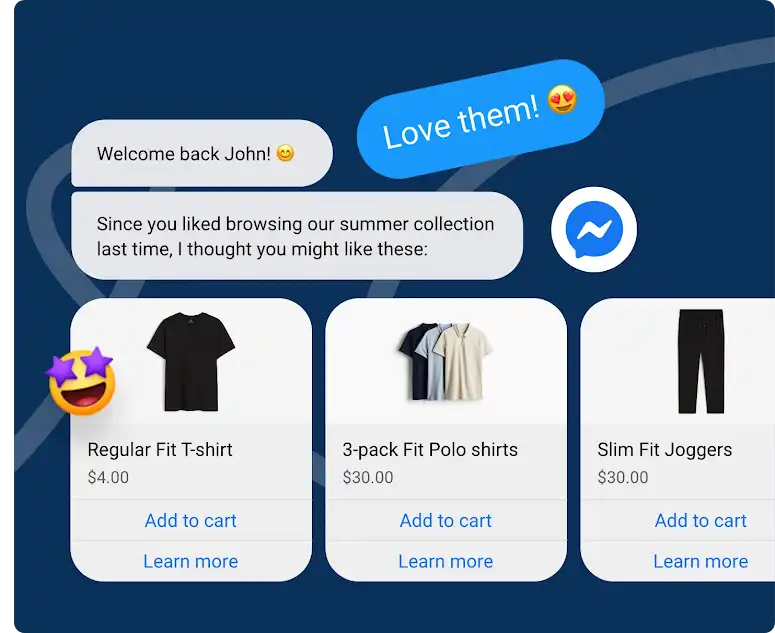
Facebook chatbots have some impressive user reach and engagement capabilities, like:
The wide user base of Facebook Messenger
With more than over 2.8 billion monthly active users, Facebook Messenger provides an enormous potential audience for businesses.
By integrating a chatbot into the Messenger platform, businesses can tap into this large user base and connect with customers on a whole new level. It's like having a storefront on the busiest street of an online metropolis!
Tools for acquiring and engaging users
Facebook provides businesses with a range of tools to acquire and engage users.
From ads and sponsored messages to buttons and plugins, businesses can leverage these tools to drive traffic and encourage users to interact with their Messenger chatbot. It's all about creating a seamless user experience that keeps them returning for more.
And beginning with Facebook chatbots isn't that tough! Meet BotPenguin, the home of chatbot solutions.
With all the heavy work of chatbot development already done for you, BotPenguin allows users to integrate some of the prominent language models like GPT 4, Google PaLM, and Anthropic Claude to create AI-powered Facebook chatbots that can do things like customer support automation, sending order updates, running abandoned cart recovery campaigns, and more
Increasing customer loyalty through Messenger chatbots
Customer loyalty is one of the best advantages of employing Facebook chatbots.
Businesses may establish enduring bonds with their clients by delivering specialized advice, immediately responding to queries, and distributing special offers. These chatbots are like virtual personal shoppers, always there to provide the best service!
User Reach and Engagement of WhatsApp Chatbots
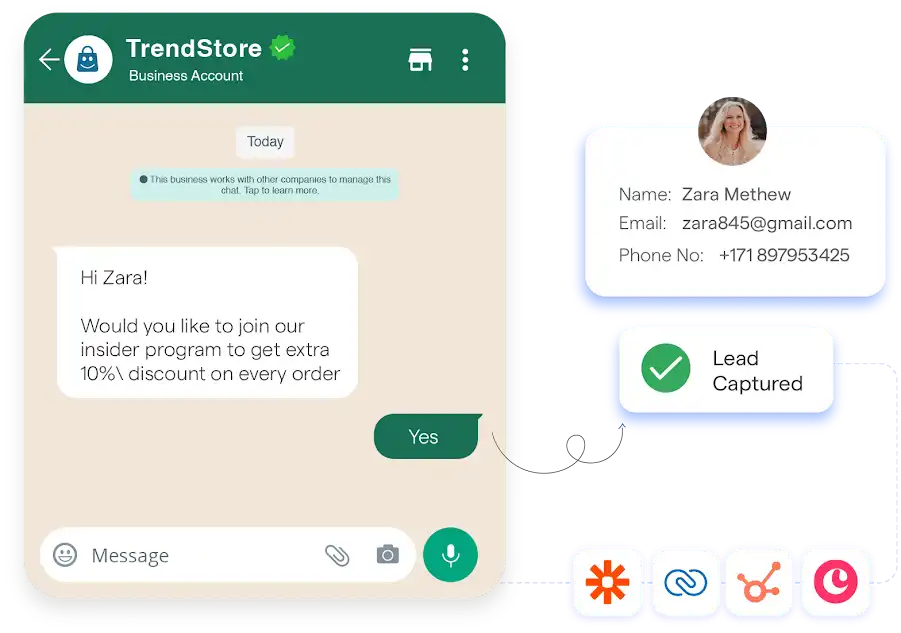
Regarding user reach and engagement, WhatsApp chatbots are no slouch either. They offer unique features that can help businesses connect with their customers.
Leveraging the popularity of WhatsApp
With over two billion monthly users, WhatsApp is one of the most widely used messaging services worldwide.
Businesses can access this enormous user base and communicate with their clients on a platform they already know and love by incorporating a chatbot into WhatsApp.
Personalized communication and engagement
WhatsApp chatbots allow for personalized communication and engagement with customers.
From sending transactional updates and order confirmations to providing support and answering queries, these chatbots enable businesses to deliver a seamless and personalized experience. It's like having a virtual concierge service at your customers' fingertips!
Building customer loyalty through convenience
The convenience of WhatsApp chatbots plays a key role in building customer loyalty.
Customers can easily reach out to businesses, get quick responses, and have all their interactions in one place. It's like having a dedicated customer support line that's available 24/7. No more waiting on hold or searching for emails!
Facebook Chatbot vs WhatsApp Chatbot: Ease of Development and Integration
Chatbots are gaining popularity as businesses seek ways to engage with their customers efficiently.
Regarding developing and integrating chatbots, Facebook Chatbots and WhatsApp Chatbots are two of the best options available.
Let's take a closer look at both chatbot platforms’s ease of development and integration. .
Ease of Development and Integration of Facebook Chatbots
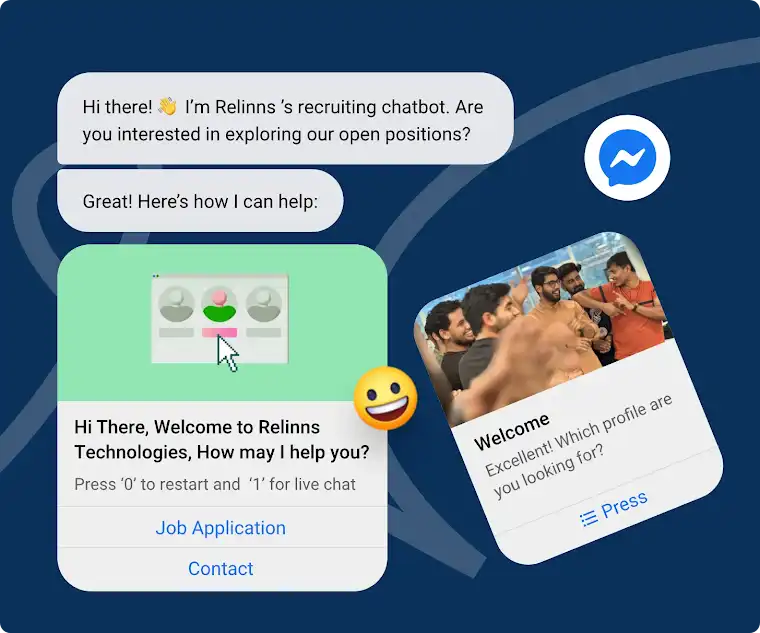
With over 2.8 billion monthly active users, Facebook provides a massive user base for businesses to connect with customers.
Thanks to its user-friendly APIs, extensive documentation, and supportive community, developing a chatbot for Facebook is easy.
Moreover, Facebook Chatbots can be seamlessly integrated into Facebook Pages, Messenger, and third-party integrations into other chat platforms, making it easy for businesses to provide quick responses to queries and personalized experiences to customers.
From providing customer support to conducting surveys and processing transactions, Facebook Chatbots allow businesses to engage with their customers through various channels and drive growth.
Ease of Development and Integration of WhatsApp Chatbots
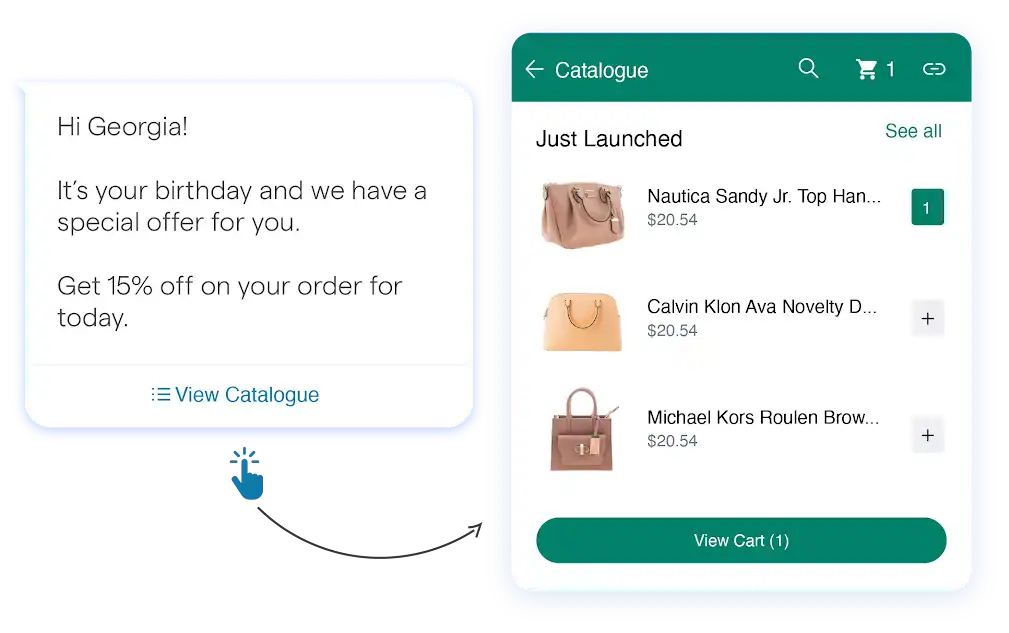
With more than over 2 billion monthly active users worldwide, WhatsApp is the go-to messaging app for billions of people.
Leveraging this app for chatbots provides companies with a massive opportunity to connect with their customers.
Developing a WhatsApp Chatbot is relatively easy using WhatsApp Business API, which requires approval. Once approved, businesses can support their customers, automate interactions, and sell products and services via the app.
WhatsApp also offers a well-documented API and developer tools that simplify integrating chatbots into existing business systems. This enables businesses to integrate chatbots into their CRM systems, e-commerce platforms, and other third-party applications.
Facebook Chatbot vs WhatsApp Chatbot: Pros and Cons
In this section, you’ll find the comparison on pros and cons between Facebook chatbot vs WhatsApp chatbot.
Facebook Chatbot vs WhatsApp Chatbot: Pros
Here are the pros of Facebook chatbot and WhatsApp chatbot.
Pros of Facebook Chatbot
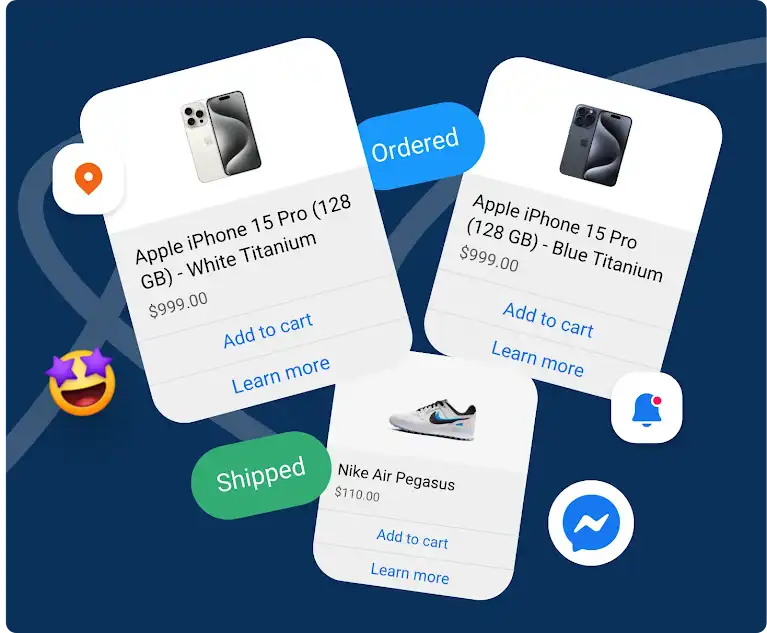
The pros of Facebook chatbot are the following:
Huge potential audience due to the large user base of Facebook.
Easy integration with Facebook Pages and Messenger.
Extensive documentation and supportive community for development.
Multiple channels for customer interaction and personalized experiences.
Ability to conduct surveys, provide customer support, and process transactions.
Pros of WhatsApp Chatbot
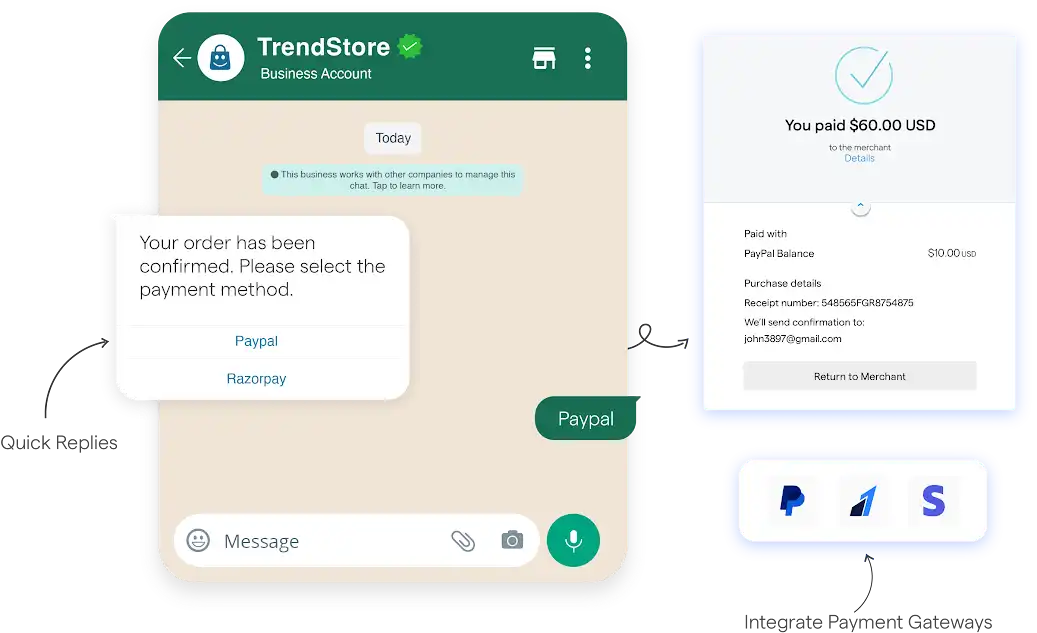
The pros of WhatsApp chatbot are the following:
WhatsApp has a massive user base with over 2 billion monthly active users worldwide.
Integration with WhatsApp Business API allows for personalized interactions.
Ability to provide support, automate interactions, and sell products/services.
Well-documented API and developer tools for easy integration.
Facebook Chatbot vs WhatsApp Chatbot: Cons
Here are the cons of Facebook chatbot and WhatsApp chatbot.
Cons of Facebook Chatbot
The cons of Facebook chatbot are the following:
Limited to the Facebook platform and its user base.
More competition and saturation from other businesses and chatbots.
It may require more effort to stand out and provide unique experiences.
Some limitations in terms of natural language processing and AI capabilities.
Suggested Reading:
Why BotPenguin is the best Facebook Chatbot platform?
Cons of WhatsApp Chatbot
The cons of WhatsApp chatbot are the following:
You need to go through an approval process to use WhatsApp Business API.
Limited features and interaction options compared to Facebook chatbots.
Restricted to the WhatsApp platform and its user base.
Conclusion
While Facebook and WhatsApp chatbots have unique strengths and weaknesses, businesses should consider their target audience and specific communication needs when deciding which platform to leverage.
Facebook chatbot platforms offer a more extensive reach with over 2.7 billion monthly active users. WhatsApp chatbots' high engagement rates make it a valuable tool for businesses operating in local or regional markets.
Whether you opt for a Facebook chatbot or WhatsApp chatbot, Botpenguin provides chatbot solutions for both chatbot platforms, including seamless integration with many other tools that can help you with your business needs.
By staying abreast of emerging trends and leveraging best practices, businesses can create compelling chatbot experiences and drive meaningful engagement with their customer base.
Frequently Asked Questions (FAQs)
What are the key differences between Facebook Chatbots and WhatsApp Chatbots?
While both chatbot platforms support chatbots, Facebook Chatbots are primarily used for marketing and customer engagement, while WhatsApp Chatbots focus more on customer support and transactional interactions. Additionally, Facebook offers more extensive targeting and advertising options compared to WhatsApp.
Can I use the same chatbot for both Facebook and WhatsApp?
In most cases, chatbots built for Facebook cannot be directly used on WhatsApp due to differences in platform requirements and integration methods. However, some chatbot development platforms offer multi-channel support, allowing you to create separate chatbot versions for each platform.
Are there any limitations to consider when using chatbots on Facebook or WhatsApp?
Both chatbot platforms have certain limitations. For example, Facebook imposes stricter rules on promotional content and messaging frequency, while WhatsApp has stricter policies regarding business verification and user consent for communication. Understanding these limitations is crucial for compliance and optimal chatbot performance.
Which chatbot platforms offer better integration options for chatbots with external systems?
Facebook provides more extensive integration options with external systems, APIs, and third-party tools compared to WhatsApp. Facebook's platform allows for seamless integration with CRM systems, marketing automation platforms, and other business tools, offering enhanced functionality and data synchronization for chatbots.


